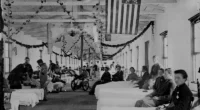In the early 1800s, a con man from New York named William “Warner” Thompson was selling swamp land in Florida.
He made up stories that people could find gold and gems on the property and convinced many to buy it. It wasn’t until much later that they found out he had been lying all along.
The florida swamp land for sale is a con that has been around since the early 1800s. It was used as a way to sell Florida swamp land to people who were desperate to escape from their current lives.
When the land boom of the 1920s came to an end, two million buyers paid the price for their naiveté.
The 1920s Florida Boom and How It Contributed to the Great Depression
In his novel Requiem for a Nun, William Faulkner said, “The past is never dead.” “It hasn’t even happened yet.” That is definitely the case in Florida, where Christopher Knowlton’s fascinating, sometimes grotesque tale of speculating fever in the 1920s takes place.
The hucksterism of the developers who suckered more than two million Americans into attempting life in the Sunshine State a century ago is reflected in bizarre click-inducing scams featuring “Florida Man” today.
Few groups had a bigger impact on the growth of Florida than “the tin can tourists,” who came by car and truck with tents and food supplies. (Photo courtesy of the Florida Internet History Center)
A army of hustlers distributed hunks of the Everglades to anybody with a down payment between the conclusion of World War I and the region’s real estate market’s collapse in 1927.
As house prices in Florida’s severely overbuilt housing market plummeted, many middle-class migrators watched their money dissolve like sugar in water. D.P Davis, a Tampa developer, sold hundreds of lots in hours without informing purchasers that their homes were flooded.
With sand carried from Biscayne Bay, Carl Fisher nearly single-handedly created Miami Beach. After spending five years in federal prison for mail fraud, Charles Ponzi of the Ponzi scheme fame comes up in Jacksonville, double-crossing dupes.
When Florida authorities discovered his real estate scheme, Ponzi fled town, pretended to die, and boarded a ship bound for Houston as a sailor.
Knowlton, author of Cattle Kingdom: The Hidden History of the Cowboy West, one of the greatest history books of 2017, juxtaposes economic and cultural history in as fascinating a manner as anybody writing now.
The author’s unwillingness to explain his ballyhoo-ridden subtitle, which seems to be more Florida-grade logrolling than content, is the major flaw in an otherwise great book.
Instead of being the straw that swirled the dizzy drink, the author shows that the overheated exuberance of the Florida land market mirrored national tendencies.
Although he isn’t forging new ground—Kenneth Ballinger’s Miami Millions (1936) was the first of several outstanding titles in this category—his take on the league may be the best.
Bubble in the Sun is the new gold standard on the classic bait-and-switch, thanks to Knowlton’s eye and ear for intriguing people and superb storytelling skills.
Clayton Trutor is a history professor at Norwich University in Northfield, Vermont, where he teaches American history. @ClaytonTrutor is his Twitter handle.
The fake real estate buyers were con men that sold Florida swamp land to people in the early 1900s. They would buy up all of the land and then sell it back to the same person at a higher price.
